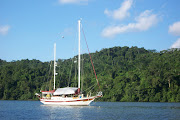You activated your EPIRB... now what?
| Have you ever wondered exactly how one actually gets rescued after they pull the trigger on their
Have you ever wondered exactly how one actually gets rescued after they pull the trigger on their 406mhz Emergency Position Indicating Radio Beacons (EPIRB)? Or what about if you happen to be that unlucky soul who didn't register their EPIRB? Well I thought I would run down the quick and dirty of what happens when the Search and Rescue system is activated by the use of an EPIRB and a little hypotheticalness. Before I do this though I'll let you know that I am not an expert in the ways of being a SAR Controller, I am what's considered a junior as I have just under a year of real experience. That being said, I been down the road plenty of times to discuss how it works and I invite all of you Salty SAR Dawgs out there to fill in the gaps or leave your comments.
We've all seen the picture to the right depicting how the SAR system works when using an EPIRB, but do you really know what's going on in the picture? Here is the short and quick: Boat/Airplane/Person activates their EPIRB/PLB, from there it heads up to a satellite sitting around 850 kilometers (528 miles, there are actually two types of satellites... not for this post) which in turn bounces the signal to the nearest Local User Terminal (LUT), it's then pushed to the Mission Control Center (MCC) which will send it to a little computer sitting inside the Rescue Coordination Center (RCC). The MCC for the Untied States is run by NOAA and the RCC in this case is where I currently work... RCC Norfolk. This whole process is relativity quick so long as a satellite is in view of an EPIRB. This whole process is only the beginning of the work though.
After we get a "hit" from the SARSAT computer located in the office the game begins. These messages come in a variety of flavors, for which we'll consider the "kind" of case these may be-
- Registered but Unlocated
- Unregistered/Unlocated
- 50/50 Split
- Garbled Solution
- E-Solution (95% of the time this is the Holy Grail of "hits")
- Uncertainty
- Alert
- Distress, and
- Ummm?
The captain aboard the vessel BAD LUCK decides he's had a little too much to drink and for some unknown reason decides to shoot a hole into the bottom of his boat with a shotgun, which not only make a sizable hole, but also disables any type of dewatering equipment he may had... bad luck. His ever vigilant wife, after screaming and potentially hitting her husband, quickly makes her way to where they keep their 406 EBIRB, grabs it as she is pondering getting into the liferaft without her husband, and turns in on. Here is where the aforementioned determination comes into play as to (1) what kind of an EPIRB case this is, and (2) what's our Emergency Phase?
Here are the possible (hypothetical) scenarios that could go down after the wife turns on the EPIRB; and for arguments sake we're only considering 406mhz EPIRB's as 121.5/243 are no longer tracked (thank goodness).
- After setting off the EPIRB the husband notices the strobe light going off on top of his beacon and says to his wife "I wish I would have registered that..."
- After the EPIRB has begun to go off the signal works its way to the nearest RCC by way of computers from around the world (other factor do play in...) and is received on their local computer system. For us in the District Command Centers we receive a nice little print out showing us all the beacon and registration information. In the case of these boaters it's not going to tell us much as it was never registered. Without registration we don't have any names, boat type, contact #'s, or homeport. Well the first hit comes through the system, and as it's not 100% accurate it's telling us that these poor people may be in either the Great Lakes area or off the coast of Georgia. And as we know something is wrong we're at least in the Alert Phase. Bummer though, as now we need to wait for next pass which won't be for another 2 hours... After the two hours pass this couple is lucky as we've received second hit with a "solution" giving us a 76% probability of their location... help may be is on the way to their location 40 nautical miles off of Savannah, GA.
- After setting off the EPIRB the husband says to his wife "did the guy we bought this boat from say he was going to change the 406 info, or were we supposed to do that?"
- Well it just so happens that Joe, the previous owner, did not updated the information and it's still registered in his name. After trying to track down Joe for about 3 hours by running all sorts of databases and contacting secondary contacts we finally get in touch with him at some bar called the Crows Nest. He didn't remember your names and wanted us to make sure that in the event that we do find you that we tell you that you were suckers for buying that boat... whatever that means. Anyhow, he, for some reason or another, forgot to mention to anyone that there was a satellite phone waterproofed in the liferaft... we get the number and give it a call. But it doesn't work... bummer. Since Joe didn't have anymore information on you, the "sucker" owners, we say goodbye to Joe. We continue to wait for the next pass, but we never get one; only a missed-pass which tells us the signal is no longer there. Did you check the battery after purchasing that boat? Um, yes, they do have batteries... and they do die. Well, as luck would have it, the Coast Guard will be sending a Cutter out in that area on a scheduled patrol in about 22 days- hold tight. This particular case would have been placed under the Alert ("Ummm") Phase.
- After setting off the EPIRB, grabbing her moron husband, and sitting comfortably in the well stocked life raft the wife thinks to herself "I'm glad I registered this thing a few months ago."
- After arguing in the liferaft for about an hour the couple sees in the distance a faint light above the horizon and it's coming towards them fast. Well, as luck would have it the wife did properly register that EPIRB and as soon the Rescue Coordination Center received it we started calling the contacts on it- we are in the Distress Phase here as the message gave us a split noting that you may be off the coast of Georgia or inport up in NY. As we wait for the second hit to come in around 1.5 hours from now one of your contacts, a sister, stated that you were heading off the Georgia coast about 40 nautical miles for a romantic getaway (not workin' out so well 'eh?). This information jives with what the first satellite hit is telling us and as such we launch a HH-60 (this is all hypothetical... there's HH-65's in Savannah, GA) to your estimated location. Thank goodness the wife register the EPIRB as we were able to quickly verify all the available information and cross check it. Next time though, you may want to think twice about firing a shotgun into the bottom of a seagoing vessel.
- After setting off the EPIRB the husband starts to cry to his wife because he never wanted to have to actually use that $800 EPIRB with integrated GPS... "it was just to look at."
- Well it looks like the best of two worlds here. Not only does Mr. Happy Shooter have the mind to register his EPIRB with NOAA he also had to one-up his brother-in-law by getting an EPIRB with integrated GPS. Doing so was good for him and his wife. The integrated signal gives us, in the Command Centers, a message with what's called an "E" solution which means we have an exact (most of the time) location of where that EPIRB is. And as we can see on the print-out it's been recently updated which leaves us to believe that this is not a good situation for the folks on that boat. We are in the Distress Phase here and launch immediately. Bummer though, as you didn't have any flares on you the HH-65 didn't see you. Not to worry though, in about an hour or so an HC-130 will be on it's way for it's first light search... he'll find you.
I hope this has been a little informative and thought provoking. The thought I'm hoping to provoke is the one that makes you remember to check your EPIRB info and battery. Happy sailing.
Register you EPIRB with NOAA here.
And just for your trivia knowledge database here is what the U.S. Coast Guard Addendum to the United States National SAR Supplement states for each Emergency Phase.
Emergency Phase: Classification made by the SAR Mission Coordinator (SMC) upon receiving a request for assistance. The three emergency phases; i.e., UNCERTAINTY, ALERT, and DISTRESS, are described in reference (a). A shortened definition of each is:
(a) An UNCERTAINTY phase exists when there is knowledge of a situation that may need to be monitored, or to have more information gathered, but that does not require moving resources.
(b) An ALERT phase exists when a craft or person is experiencing some difficulty and may need assistance, but is not in immediate danger or in need of immediate response. Apprehension is usually associated with the ALERT phase.
(c) The DISTRESS phase exists when grave or imminent danger requiring immediate response to the distress scene threatens a craft or person.








No comments:
Post a Comment
Note: Only a member of this blog may post a comment.